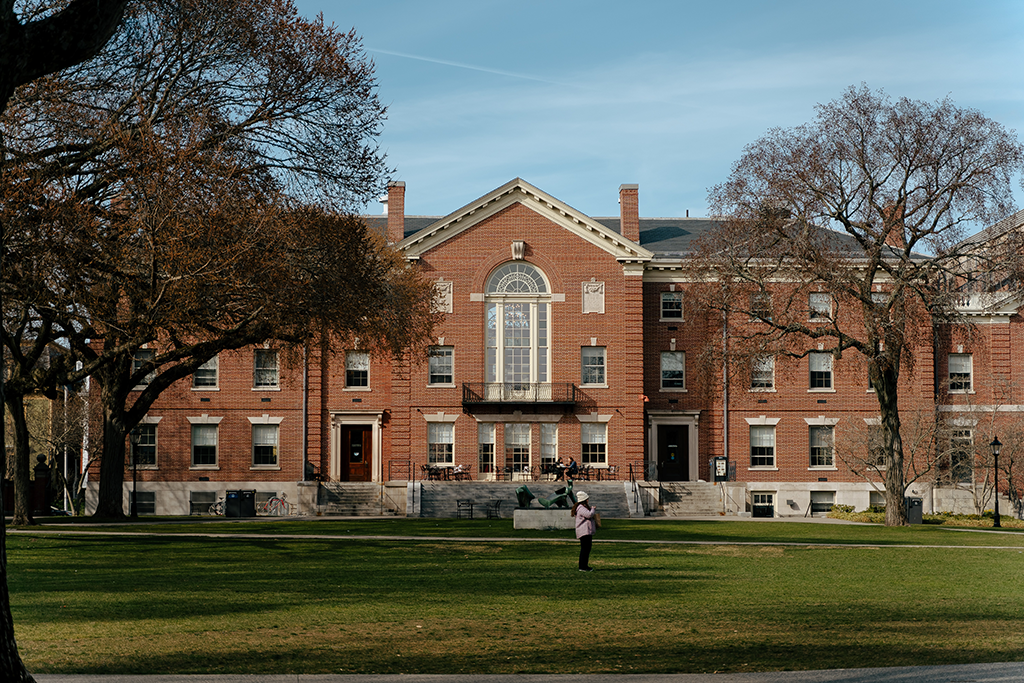As a prestigious liberal arts and Ivy League institution, Brown University has high expectations from its applicants regarding the quality of their written essays. However, these supplemental essays are by no means unapproachable. With proper planning and execution, successful essays can reflect extremely well upon an applicant. You have the opportunity to showcase multiple facets of your personality and demonstrate the abilities that will help you thrive at Brown. In this article, we will guide you through how to write the Brown University supplemental essays.

Brown University’s 2024-2025 Prompts
Supplemental Essay Prompts
- Brown’s Open Curriculum allows students to explore broadly while also diving deeply into their academic pursuits. Tell us about any academic interests that excite you, and how you might pursue them at Brown. (200-250 words)
- Students entering Brown often find that making their home on College Hill naturally invites reflection on where they came from. Share how an aspect of your growing up has inspired or challenged you, and what unique contributions this might allow you to make to the Brown community. (200-250 words)
- Brown students care deeply about their work and the world around them. Students find contentment, satisfaction, and meaning in daily interactions and major discoveries. Whether big or small, mundane or spectacular, tell us about something that brings you joy. (200-250 words)
Brief Reflection Prompts
Note that these prompts are found in the Common App as part of Brown’s writing supplement, and are required questions. Instead, they are not found in the Common Application section of Brown’s “How to Apply” web page.
- What three words best describe you? (3 words)
- What is your most meaningful extracurricular commitment, and what would you like us to know about it? (100 words or fewer)
- If you could teach a class on any one thing, whether academic or otherwise, what would it be? (100 words or fewer)
- In one sentence, Why Brown? (50 words or fewer)

General Tips
One of the key features about each of these Brown University supplemental essays is their length: they are short. Limiting each response to 250 words maximum can be challenging, especially when discussing complex interests or topics about which you are passionate. The key to writing a succinct yet impactful essay is to limit the words spent on narrative or objective descriptions and instead devote space to emotions, thoughts, and reflections. For instance, compare…
“Painting brings me joy. When I was five years old, my father bought me my first set of paintbrushes. Since then, I have painted every day, joining art clubs in middle and high school and collaborating with peers on projects in the community. We painted murals and posters for events and local exhibitions, learning and meeting new people as we did so. My skills have improved over time, and I aim to continue my development as an artist and a creative in college and beyond.”
…to the following:
“Painting brings me joy. Ever since receiving my first set of brushes at five years old, I have embraced the challenge of setting color to paper to create brilliant images. As I improved over time, I searched for ways to share the satisfaction of art with others. Orchestrating community projects allowed me to connect with peers and express my gratitude for my hometown. As I continue to develop my skills, I will spread that joy to an even broader audience in college and beyond.”
These two passages have the same word count. However, the second much more effectively gives the reader a sense of who the writer is and what they value about their interest in painting. Instead of simply listing the factual details of an interest or event, academic or otherwise, you can give the reader a glimpse into your emotions and thought processes. Doing so will increase the impact of each word, allowing you to convey your meaning more succinctly.
Brown University’s Supplemental Essay Prompts
Brown’s Open Curriculum allows students to explore broadly while also diving deeply into their academic pursuits. Tell us about any academic interests that excite you, and how you might pursue them at Brown. (200-250 words)
This first prompt is an iteration of the common “Why X University?” essay type. What makes this prompt unique is that Brown’s Open Curriculum is highlighted. Students are expected to demonstrate a basic understanding of the core tenets of this curriculum in their essay responses.
Essentially, the Open Curriculum at Brown University allows undergraduates to forego the general education and distribution requirements mandated by most colleges and universities and instead enables students to formulate their own paths of study. Some students even develop their own majors based on personal interests that they enter with or discover along the way. This first essay asks applicants to consider how they would make the most of this unique flexibility.
First and foremost, research the Open Curriculum. Read about how current and past students have approached this opportunity, and consider how you would do so yourself. Then, brainstorm. Write out a list of your academic interests. Let these interests range from your intended major to potential interests that you would like to develop further, and everything in between. For now, the more the merrier!
Consider browsing the academic offerings to find departments, courses, or tracks that align with your interests. Lastly, and arguably, most importantly, look for connections between your areas of interest and explore how you could connect them. This is the greatest and most unique benefit of Brown’s Open Curriculum: you can craft your own unique educational experience.
Be sure to delve into the why: Why combine the interests you choose? What added benefit do you gain by studying simultaneously across disciplines? This interdisciplinary emphasis on exploration is central to Brown’s values as a university.
Students entering Brown often find that making their home on College Hill naturally invites reflection on where they came from. Share how an aspect of your growing up has inspired or challenged you, and what unique contributions this might allow you to make to the Brown community. (200-250 words)
This second prompt asks Brown applicants to discuss their backgrounds, past adversity, perspectives, growth, and/or community involvement. But 200-250 words is not much room to tell the story of your upbringing! If possible, choose a specific 1-3 anecdote(s) to share. Your anecdote(s) should be from your childhood and involve details about your unique upbringing.
If you have a cultural background, unusual childhood experience, or significant period of growth in your personal history, now might be the time to bring it up in your application. This essay gives you the meaningful opportunity to engage with a part of your past that otherwise wouldn’t have made it into your application. Generally, applications focus on high school experiences, but this essay can (and probably should) focus on an experience before high school.
One pitfall that many students fall into when writing this essay is cliché. It is really easy to describe your childhood in a generic way. But the more personal and, frankly, odd you can get in this essay, the better. Authenticity will go a long way to helping the reader remember your essay long after reading it.
Consider these questions to get your brainstorming going:
- Did you have a weird childhood habit or hobby that ended up teaching you a life lesson?
- Did you suffer bullying and come out stronger, more empathetic, and/or more sure of who you are?
- Did you have a mentor who shaped you?
- Did your hometown have a unique tradition that influenced your worldview?
Remember, growth is key in this essay. After you’ve selected your specific topic and your discrete, brief 1-3 anecdotes, make sure you clarify at the beginning of the essay who you once were. Then, by the end of the essay, clarify who you are now. Displaying growth will not only evidence your maturity but also demonstrate your college readiness and ability to answer a challenging essay question.
Brown students care deeply about their work and the world around them. Students find contentment, satisfaction, and meaning in daily interactions and major discoveries. Whether big or small, mundane or spectacular, tell us about something that brings you joy. (200-250 words)
Lastly, this third supplemental prompt is the most open-ended. This is not just a simple “extracurriculars” or “other interests” prompt, because it is so broad in its scope. As long as it brings you joy, any topic is on the table, academic, artistic, intellectual, philosophical, culinary, athletic, or otherwise. If you feel that your application so far has not done justice to an important part of yourself, then this is the time for you to address what’s as yet unsaid.
The prompt goes so far as to note that the topic can be “big or small, mundane or spectacular.” Therefore, if something specific comes to mind as you read this, then chances are it would make a strong essay, whatever it may be. The most important consideration in choosing a topic for this essay is to select something that truly does bring you joy. Readers can tell when the excitement in your tone is genuine, and that realness is what sells your essay.
As you brainstorm ideas for this essay, restrain yourself from writing about a topic that you think you “should” write about. If your true passion is baking chocolate chip cookies for your little sisters when they are feeling down, but you feel like you should write about coding because it seems more “sophisticated” or “academic,” choose the former. A genuine essay will stand out every time.
As you describe what brings you joy, try to draw the reader into your excitement. Invite them to enjoy the activity or the project with you and show them why it is that you love it. Make them love it too! Vivid descriptors and sensory details can go a long way in essays like this one. This is especially if your passion has a sensory component. Allow yourself and your readers to be swept up in “contentment, satisfaction, and meaning.” Joy is infectious, so fill your essay with as much of it as possible.
Brown University’s Brief Reflection Prompts
What three words best describe you? (3 words)
This brief reflection prompt asks you to distill your personality into a short list of descriptors: this is a huge challenge if you want to bring any nuance to your three words. However, on the flip side, although there are many “wrong” answers and many “right” answers, you’re more likely to put down a neutral answer than a “wrong” answer. In other words, if you pick three random positively connoted adjectives, for instance, those words’ impact on your application will probably be neutral or positive.
That said, there are things you can do to increase your chances of positively influencing your application with your three words: Be consistent and inconsistent.
Being consistent with the rest of your application is great, and 1-2 of your words should somehow be synonymous or consistent with the rest of your application. If you have an amazing academic record, maybe one of your descriptors is “hardworking” or “driven.” If you’re applying to study English or Creative Writing, maybe one of your descriptors is “writer” or “reader.” These are consistent descriptors, so that your response feels like it is part of the same application as the rest of your materials.
Being inconsistent allows you to add new value to your application. Maybe you’re applying to study Neuroscience, but one of your words is “illustrator” or “artistic.” Maybe your application deals with really serious topics all throughout, and yet you put that you’re “cheerful” or “playful.” Adding dimension to your personality through these words allows you to bring something new to this essay, even though it’s so short: every response on your application can help you out!
What is your most meaningful extracurricular commitment, and what would you like us to know about it? (100 words)
Like all of your other essay responses, this brief reflection is another moment to provide something to your application reader that they can’t get from reading the rest of your application. Note the wording of this prompt: “What would you like us to know about [your most meaningful extracurricular commitment]?” This question implies that what you would like the reader to know is something they can’t possibly already know.
In the case of some students, this brief response is the opportunity necessary to clarify something about their extracurricular commitment. For instance, maybe your most meaningful extracurricular has a weird title, and you’re concerned that your activities list in the Common App can’t possibly do it justice. Or perhaps your commitment hours for this extracurricular look strangely high or low, and you’d like the chance to explain it.
In the case of other students, the activities section of the Common App does their activities justice, and thus this essay is a bonus to bring more nuance to their most meaningful activity. If that sounds like you, here are some tips to make this essay response the strongest it can be.
- Answer your FAQ(s). If you describe this activity to your friends, do they all ask the same silly question? For instance, if you’re a coxswain on a rowing team, and people always ask you “What’s the point of your position and why do you need to train?”, you could take this essay as an opportunity to explain the importance of your position and why you train with the rest of the team.
- Make it personal. College admissions officers have seen a lot. Moreover, they have probably seen many applicants with the same or similar extracurricular as you. Clarify why you as an individual find meaning in this extracurricular, and how this extracurricular fits into your life.
- Show growth. Your activities list might mention that you started as Junior Editor in a literary magazine and are now Editor-in-Chief. But, for all admissions officers know, that promotion was just because you were the only 12th-grader in the magazine. In this short essay, you can write about
- how you’ve grown through this activity
- how this activity has changed you
- how you have changed the activity
- how your growth has impacted your relationship with the activity.
If you could teach a class on any one thing, whether academic or otherwise, what would it be? (100 words)
This final prompt toes a fine line: many students who answer this question earnestly end up sounding full of themselves. There are three main ways to answer this question. First, you can suggest teaching a class on something you legitimately have deep knowledge of. Second, you can suggest teaching a class on something you obviously have no knowledge of. Or, third, you can suggest teaching a class on something you might have some knowledge of.
If you already have deep knowledge of the subject of your imaginary class, then humbly clarify this before listing your reasons for wanting to teach a class on it. Specifically, these should be reasons other than “I am (already) an expert in this topic.” For instance, you might be an extremely talented potter, but your pottery talents don’t come up elsewhere in your application. Thus, you’ll need to discuss your pottery talents briefly, authentically, and modestly before describing why you’d like to teach a pottery class.
If you obviously don’t have knowledge of the subject of your imaginary class, then you’ll want to briefly express why you’d like to know about this topic before explaining why you’d like to teach a class on it. And again, your reasons for teaching this class need to be more than just that you’d like to be an expert who is capable of teaching a class in it. For instance, if you’d like to teach a class on how to safely jump out of a plane, you’re going to first want to clarify why you’d like to be an expert in jumping out of planes before explaining why you’d like to teach other people how to jump out of planes.
If you have some knowledge of the subject of your imaginary class, then you’ll want to clarify the limited extent of your knowledge before explaining why you’d like to learn more about this topic and teach a class on it. For instance, if you would like to teach a class on particle physics, you’ll want to briefly express how much/little you know about the topic. Then, you’ll want to explain why you’re compelled to learn more and to teach people more about particle physics.
When wrapping up your brief reflection, you may want to give an indication of how you will teach the class and/or to whom you would like to teach the class. That said, this is totally up to you and depends on how many words you have left over.
In one sentence, Why Brown? (50 words)
This deceptively simple prompt requires you to distill your reasons for applying to Brown into just one sentence. Although you can compose up to 50 words in your response, make sure it’s all one sentence. Moreover, don’t feel pressure to get close to meeting the 50-word maximum.
Specificity is key in this answer. Many students may feel compelled by Brown’s open curriculum, extensive research opportunities, and beautiful New England campus. However, the best essay responses will stand out from the crowd. Therefore, it’s key that you identify why you specifically are drawn to Brown. Are there specific courses you hope to take? Is there a professor you hope to work with? Does the PLME program provide your ideal educational experience? Whatever your reasons, you’ll likely need to do some research in order to identify them. As long as you’re specific, clear, and genuine, though, you’ll do well in this essay.
If you need help polishing up your Brown University supplemental essays, check out our College Essay Review service. You can receive detailed feedback from Ivy League consultants in as little as 24 hours.





